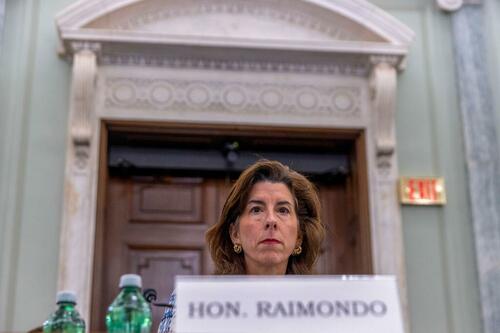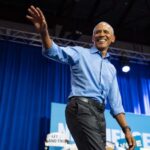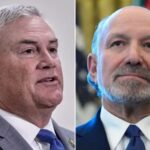
By Peter Schweizer of the Gatestone Institute
-
The Commerce Department is the fourth most lobbied federal office, behind only the Treasury Department, Health & Human Services, and the White House itself. It is more lobbied than the bigger budgeted Department of Defense and Department of Transportation, despite managing a far smaller budget. This is no accident, because Commerce makes what can be life-and-death decisions for particular industries and businesses.
-
Yet the mission of this "hodgepodge" of administrative agencies, bureaus, and offices could not be more important. The Commerce Department's broad purpose is "to create the conditions for economic growth and opportunity."
-
Through its Bureau of Industry and Security, Commerce regulates what are known as "dual use" technologies, which have potential military applications for foreign powers, another sore spot in the US-China relationship.
The US Department of Commerce seldom grabs headlines or congressional scrutiny. It does not become "weaponized" against political opponents of the incumbent party. After the 2016 election, an article on Vox about incoming power-players of the Trump administration dismissed the department as a "hodgepodge of agencies," and a "Cabinet backwater."

Yet the mission of this "hodgepodge" of administrative agencies, bureaus, and offices could not be more important. The Commerce Department's broad purpose is "to create the conditions for economic growth and opportunity." The department has an important role in setting and executing US domestic and international trade policy. It administers tariffs and even arms control, through its regulatory oversight of military exports. These functions receive quite a bit more attention than the activities of such workaday agencies as the National Weather Service, the Bureau of the Census, and the US Patent and Trademark Office.
The Government Accountability Institute (GAI), (full disclosure: of which I am president) just released an investigative report called "Commerce Cronyism: Inside Deals, Conflicts of Interest & Chinese Connections," that takes a close look at this rarely scrutinized "backwater." We found that, as in most backwaters, a lot of strange things happen there.
The Commerce Department is the fourth most lobbied federal office, behind only the Treasury Department, Health & Human Services, and the White House itself. It is more lobbied than the bigger budgeted Department of Defense and Department of Transportation, despite managing a far smaller budget. This is no accident, because Commerce makes what can be life-and-death decisions for particular industries and businesses.
The trade war with China gave the Commerce Department tremendous influence over this critical policy area. The Trade Expansion Act of 1962 gave the Commerce Department authority to investigate the effect of imports on US national security. Effectively, the department creates the groundwork for tariffs. Through its Bureau of Industry and Security, Commerce regulates what are known as "dual use" technologies, which have potential military applications for foreign powers, another sore spot in the US-China relationship.
As one aspect of its report, GAI investigated the personal financial benefits that accrued to the past several Secretaries of Commerce -- how they benefited their own interests through department decisions. GAI also found that China has learned how to tap into the Commerce Department for its own benefit. They have been doing it for years, across several different administrations, among Democrats and Republicans alike.
Let's start with the current Secretary of Commerce, Gina Raimondo. A previous governor of Rhode Island, Raimondo comes with a background in finance. She founded the venture capital firm Point Judith Capital in 2000. She is worth roughly $10 million, based on her financial disclosure and as reported by Forbes magazine. Raimondo's husband, Andrew Moffit, spent 20 years at the consulting firm McKinsey & Co, leaving in 2020 to become "Chief People Officer" of a software company called PathAI. This company applies artificial intelligence and machine learning technology to the field of medical diagnostics.
In February of this year, Moffit exercised his PathAI stock options and purchased at least $50,000 worth of its stock. He left his full-time job with the company and became instead its "strategic adviser," thus deepening his financial ties to the firm while creating an appearance of greater distance between his role with the company and his wife's duties as Commerce secretary.
Artificial intelligence is the focus of the Commerce Department's Bureau of Industry and Security because it often has direct military applications, making it sensitive for US national security. Possible restrictions include the sharing of AI technology with foreign employees, an area in which Moffit could well be responsible as "Chief People Officer." In 2019, US-based venture capital firm Danhua Capital Management (doing business as DHVC) participated in a $60 million fundraising round for PathAI. DHVC not only has holdings in sensitive technology sectors, but also has ties to a Chinese state-owned entity. Therefore, DHVC's relationship with PathAI "could raise conflict-of-interest and/or national security concerns," according to GAI's report. Danhua is part of a pattern of companies established by the Chinese government in order to "penetrate" Silicon Valley, a Reuters report noted.
In addition, Raimondo's department has loosened restrictions on Huawei, the Chinese telecom giant that Trump administration regulators had sanctioned, because of the company's ties to the Chinese government and particularly its military. Huawei's founder, Ren Zhengfei, is a party loyalist who urged his workers to "surge forward, killing as you go, to blaze us a trail of blood," in their efforts to sell Huawei products to the West. Huawei has been identified as a security threat by the governments of Japan, Taiwan, France, Great Britain, the US, Australia, and Germany, among others.
Then there was Wilbur Ross, Secretary of Commerce under President Trump. Ross was a successful businessman with huge commercial ties to China. He had shipping companies that had major Chinese investment. In fact, Trump criticized him for being too soft on China while Ross ran the department.
Wilbur Ross kept investments in companies directly affected by tariff policy, even as the Commerce Department handed out tariff exemptions and negotiated new trade agreements. Wendy Teramoto, his chief of staff, simultaneously served on the boards of some of these companies, GAI's report notes.
According to our own 2018 analysis, 62 percent of the cargo carried into the US by one of Ross's shipping firms was South Korean steel for which Ross had helped to negotiate a tariff exemption.
Before joining Commerce, Ross founded and chaired an auto parts company with operations around the world, including Mexico and China. Ross helped renegotiate the US's trade deal with Mexico and Canada, which lowered import duties on the automotive industry, and later refused to release the results of the Department's investigation into the effects of foreign imports on the domestic automotive industry.
Before Ross, President Obama's Commerce Secretary was Penny Pritzker, part of the prominent Illinois family that is heir to the Hyatt Hotel fortune. In the years immediately before she was tapped by her fellow Chicagoan, Obama, Pritzker had focused on her own business ventures, launching PSP Capital Partners and Artemis Real Estate Partners, two investment firms.
While she was Secretary of Commerce , buildings owned by Pritzker's companies were leased to Commerce Department agencies, such as the US Patent and Trademark Office, and to Commerce Department contractors. In 2015, the Clean Energy Trust, a Chicago-based not-for-profit supporting clean energy start-ups through business development, received $10 million of funding through a grant program administered by the Department of Commerce. It was the only Chicago-area group to receive such funding. Its board of directors was co-chaired at the time by Penny Pritzker's cousin, Nick Pritzker.
GAI's report, which is available here, discusses a number of other issues, personalities, and programs that are of questionable merit but generate high interest from Washington insiders who see their potential. The cronyism of past and present Secretaries of Commerce is but one part of the story the report tells. It is worth your attention.
* * *
Peter Schweizer, President of the Governmental Accountability Institute, is a Gatestone Institute Distinguished Senior Fellow and author of the new book, Red Handed: How American Elites are Helping China Win.
By Peter Schweizer of the Gatestone Institute
-
The Commerce Department is the fourth most lobbied federal office, behind only the Treasury Department, Health & Human Services, and the White House itself. It is more lobbied than the bigger budgeted Department of Defense and Department of Transportation, despite managing a far smaller budget. This is no accident, because Commerce makes what can be life-and-death decisions for particular industries and businesses.
-
Yet the mission of this “hodgepodge” of administrative agencies, bureaus, and offices could not be more important. The Commerce Department’s broad purpose is “to create the conditions for economic growth and opportunity.”
-
Through its Bureau of Industry and Security, Commerce regulates what are known as “dual use” technologies, which have potential military applications for foreign powers, another sore spot in the US-China relationship.
The US Department of Commerce seldom grabs headlines or congressional scrutiny. It does not become “weaponized” against political opponents of the incumbent party. After the 2016 election, an article on Vox about incoming power-players of the Trump administration dismissed the department as a “hodgepodge of agencies,” and a “Cabinet backwater.”

Yet the mission of this “hodgepodge” of administrative agencies, bureaus, and offices could not be more important. The Commerce Department’s broad purpose is “to create the conditions for economic growth and opportunity.” The department has an important role in setting and executing US domestic and international trade policy. It administers tariffs and even arms control, through its regulatory oversight of military exports. These functions receive quite a bit more attention than the activities of such workaday agencies as the National Weather Service, the Bureau of the Census, and the US Patent and Trademark Office.
The Government Accountability Institute (GAI), (full disclosure: of which I am president) just released an investigative report called “Commerce Cronyism: Inside Deals, Conflicts of Interest & Chinese Connections,” that takes a close look at this rarely scrutinized “backwater.” We found that, as in most backwaters, a lot of strange things happen there.
The Commerce Department is the fourth most lobbied federal office, behind only the Treasury Department, Health & Human Services, and the White House itself. It is more lobbied than the bigger budgeted Department of Defense and Department of Transportation, despite managing a far smaller budget. This is no accident, because Commerce makes what can be life-and-death decisions for particular industries and businesses.
The trade war with China gave the Commerce Department tremendous influence over this critical policy area. The Trade Expansion Act of 1962 gave the Commerce Department authority to investigate the effect of imports on US national security. Effectively, the department creates the groundwork for tariffs. Through its Bureau of Industry and Security, Commerce regulates what are known as “dual use” technologies, which have potential military applications for foreign powers, another sore spot in the US-China relationship.
As one aspect of its report, GAI investigated the personal financial benefits that accrued to the past several Secretaries of Commerce — how they benefited their own interests through department decisions. GAI also found that China has learned how to tap into the Commerce Department for its own benefit. They have been doing it for years, across several different administrations, among Democrats and Republicans alike.
Let’s start with the current Secretary of Commerce, Gina Raimondo. A previous governor of Rhode Island, Raimondo comes with a background in finance. She founded the venture capital firm Point Judith Capital in 2000. She is worth roughly $10 million, based on her financial disclosure and as reported by Forbes magazine. Raimondo’s husband, Andrew Moffit, spent 20 years at the consulting firm McKinsey & Co, leaving in 2020 to become “Chief People Officer” of a software company called PathAI. This company applies artificial intelligence and machine learning technology to the field of medical diagnostics.
In February of this year, Moffit exercised his PathAI stock options and purchased at least $50,000 worth of its stock. He left his full-time job with the company and became instead its “strategic adviser,” thus deepening his financial ties to the firm while creating an appearance of greater distance between his role with the company and his wife’s duties as Commerce secretary.
Artificial intelligence is the focus of the Commerce Department’s Bureau of Industry and Security because it often has direct military applications, making it sensitive for US national security. Possible restrictions include the sharing of AI technology with foreign employees, an area in which Moffit could well be responsible as “Chief People Officer.” In 2019, US-based venture capital firm Danhua Capital Management (doing business as DHVC) participated in a $60 million fundraising round for PathAI. DHVC not only has holdings in sensitive technology sectors, but also has ties to a Chinese state-owned entity. Therefore, DHVC’s relationship with PathAI “could raise conflict-of-interest and/or national security concerns,” according to GAI’s report. Danhua is part of a pattern of companies established by the Chinese government in order to “penetrate” Silicon Valley, a Reuters report noted.
In addition, Raimondo’s department has loosened restrictions on Huawei, the Chinese telecom giant that Trump administration regulators had sanctioned, because of the company’s ties to the Chinese government and particularly its military. Huawei’s founder, Ren Zhengfei, is a party loyalist who urged his workers to “surge forward, killing as you go, to blaze us a trail of blood,” in their efforts to sell Huawei products to the West. Huawei has been identified as a security threat by the governments of Japan, Taiwan, France, Great Britain, the US, Australia, and Germany, among others.
Then there was Wilbur Ross, Secretary of Commerce under President Trump. Ross was a successful businessman with huge commercial ties to China. He had shipping companies that had major Chinese investment. In fact, Trump criticized him for being too soft on China while Ross ran the department.
Wilbur Ross kept investments in companies directly affected by tariff policy, even as the Commerce Department handed out tariff exemptions and negotiated new trade agreements. Wendy Teramoto, his chief of staff, simultaneously served on the boards of some of these companies, GAI’s report notes.
According to our own 2018 analysis, 62 percent of the cargo carried into the US by one of Ross’s shipping firms was South Korean steel for which Ross had helped to negotiate a tariff exemption.
Before joining Commerce, Ross founded and chaired an auto parts company with operations around the world, including Mexico and China. Ross helped renegotiate the US’s trade deal with Mexico and Canada, which lowered import duties on the automotive industry, and later refused to release the results of the Department’s investigation into the effects of foreign imports on the domestic automotive industry.
Before Ross, President Obama’s Commerce Secretary was Penny Pritzker, part of the prominent Illinois family that is heir to the Hyatt Hotel fortune. In the years immediately before she was tapped by her fellow Chicagoan, Obama, Pritzker had focused on her own business ventures, launching PSP Capital Partners and Artemis Real Estate Partners, two investment firms.
While she was Secretary of Commerce , buildings owned by Pritzker’s companies were leased to Commerce Department agencies, such as the US Patent and Trademark Office, and to Commerce Department contractors. In 2015, the Clean Energy Trust, a Chicago-based not-for-profit supporting clean energy start-ups through business development, received $10 million of funding through a grant program administered by the Department of Commerce. It was the only Chicago-area group to receive such funding. Its board of directors was co-chaired at the time by Penny Pritzker’s cousin, Nick Pritzker.
GAI’s report, which is available here, discusses a number of other issues, personalities, and programs that are of questionable merit but generate high interest from Washington insiders who see their potential. The cronyism of past and present Secretaries of Commerce is but one part of the story the report tells. It is worth your attention.
* * *
Peter Schweizer, President of the Governmental Accountability Institute, is a Gatestone Institute Distinguished Senior Fellow and author of the new book, Red Handed: How American Elites are Helping China Win.






